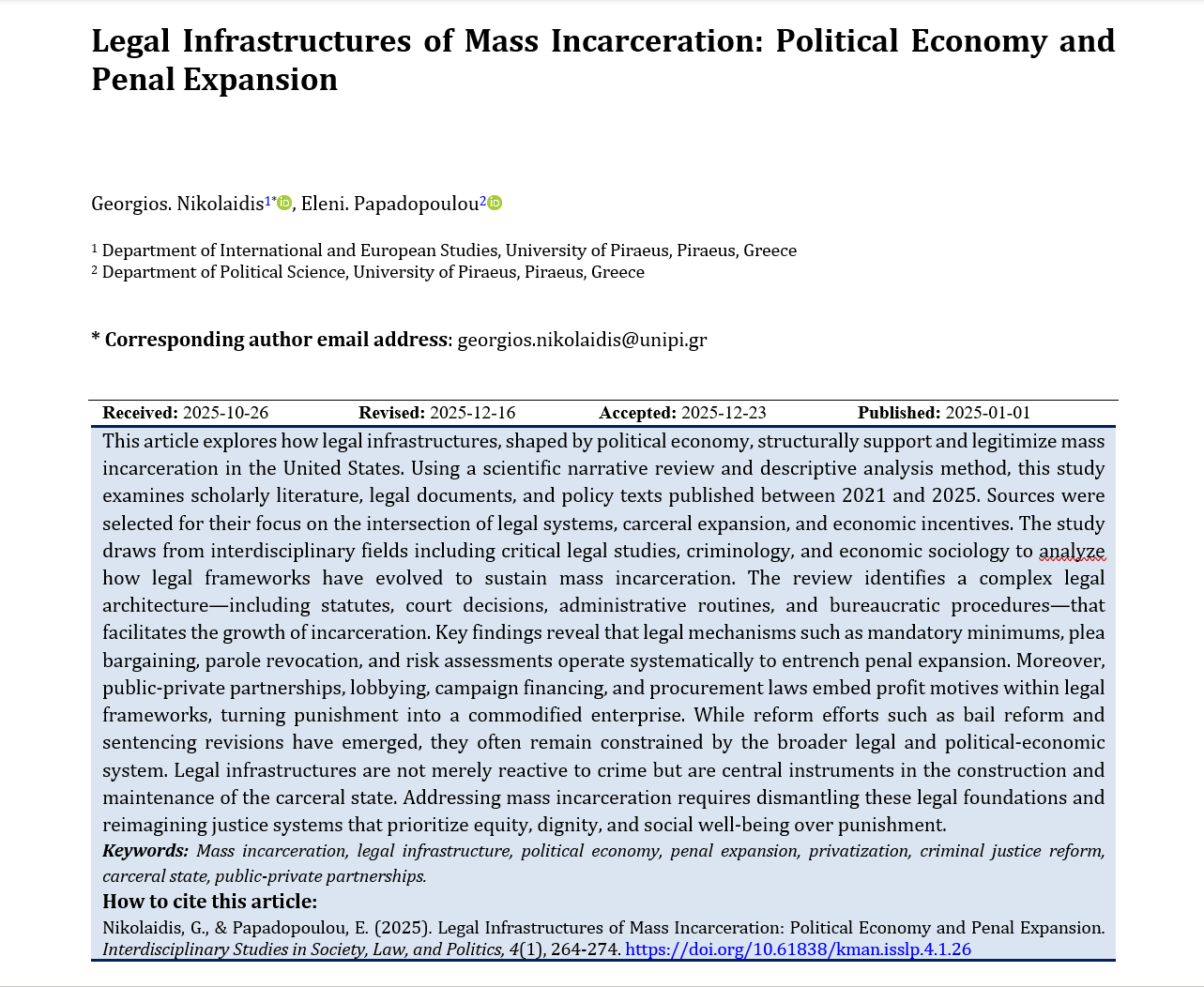Legal Infrastructures of Mass Incarceration: Political Economy and Penal Expansion
Keywords:
Mass incarceration, legal infrastructure, political economy, penal expansion, privatization, criminal justice reform, carceral state, public-private partnershipsAbstract
This article explores how legal infrastructures, shaped by political economy, structurally support and legitimize mass incarceration in the United States. Using a scientific narrative review and descriptive analysis method, this study examines scholarly literature, legal documents, and policy texts published between 2021 and 2025. Sources were selected for their focus on the intersection of legal systems, carceral expansion, and economic incentives. The study draws from interdisciplinary fields including critical legal studies, criminology, and economic sociology to analyze how legal frameworks have evolved to sustain mass incarceration. The review identifies a complex legal architecture—including statutes, court decisions, administrative routines, and bureaucratic procedures—that facilitates the growth of incarceration. Key findings reveal that legal mechanisms such as mandatory minimums, plea bargaining, parole revocation, and risk assessments operate systematically to entrench penal expansion. Moreover, public-private partnerships, lobbying, campaign financing, and procurement laws embed profit motives within legal frameworks, turning punishment into a commodified enterprise. While reform efforts such as bail reform and sentencing revisions have emerged, they often remain constrained by the broader legal and political-economic system. Legal infrastructures are not merely reactive to crime but are central instruments in the construction and maintenance of the carceral state. Addressing mass incarceration requires dismantling these legal foundations and reimagining justice systems that prioritize equity, dignity, and social well-being over punishment.
Downloads
References
Beckett, K. (2022). Reimagining Public Safety. 175-182. https://doi.org/10.1093/oso/9780197536575.003.0008
Bellin, J. (2022). Mass Incarceration Nation. https://doi.org/10.1017/9781009267595
Lurigio, A. J. (2024). The Golden Anniversary of Mass Incarceration in America. The Prison Journal, 104(3), 271-295. https://doi.org/10.1177/00328855241240131
Martínez, H. S. (2024). The Effect of Incarceration on Political Beliefs for Vulnerable Populations. https://doi.org/10.33774/apsa-2024-43rg9
Mason, P. L., Myers, S. L., & Simms, M. C. (2022). Racial Isolation and Marginalization of Economic Research on Race and Crime. Journal of Economic Literature, 60(2), 494-526. https://doi.org/10.1257/jel.20211688
McKay, T., & Darity, W. (2024). Who Benefits From Mass Incarceration? A Stratification Economics Approach to the “Collateral Consequences” of Punishment. Annual Review of Law and Social Science, 20(1), 309-330. https://doi.org/10.1146/annurev-lawsocsci-041922-033114
Menon, J. (2024). Confessional Performance: Remorse and the Affective Economy of Parole. Theatre Journal, 76(3), 287-301. https://doi.org/10.1353/tj.2024.a943400
Rice, S. (2021). Mass Incarceration. 1-7. https://doi.org/10.1002/9781118786352.wbieg2106
Scott, J., Gerson, P., & Wooten, C. (2023). Decarceration to Detention: The Political Economy of Mass-Incarceration in Louisiana. Geoforum, 146, 103851. https://doi.org/10.1016/j.geoforum.2023.103851
Simon, J. (2025). Dignity Defied: Legal-Rational Myths and the Surplus Legitimacy of the Carceral State. Law & Social Inquiry, 1-28. https://doi.org/10.1017/lsi.2024.40

Downloads
Additional Files
Published
Submitted
Revised
Accepted
Issue
Section
License

This work is licensed under a Creative Commons Attribution-NonCommercial 4.0 International License.





